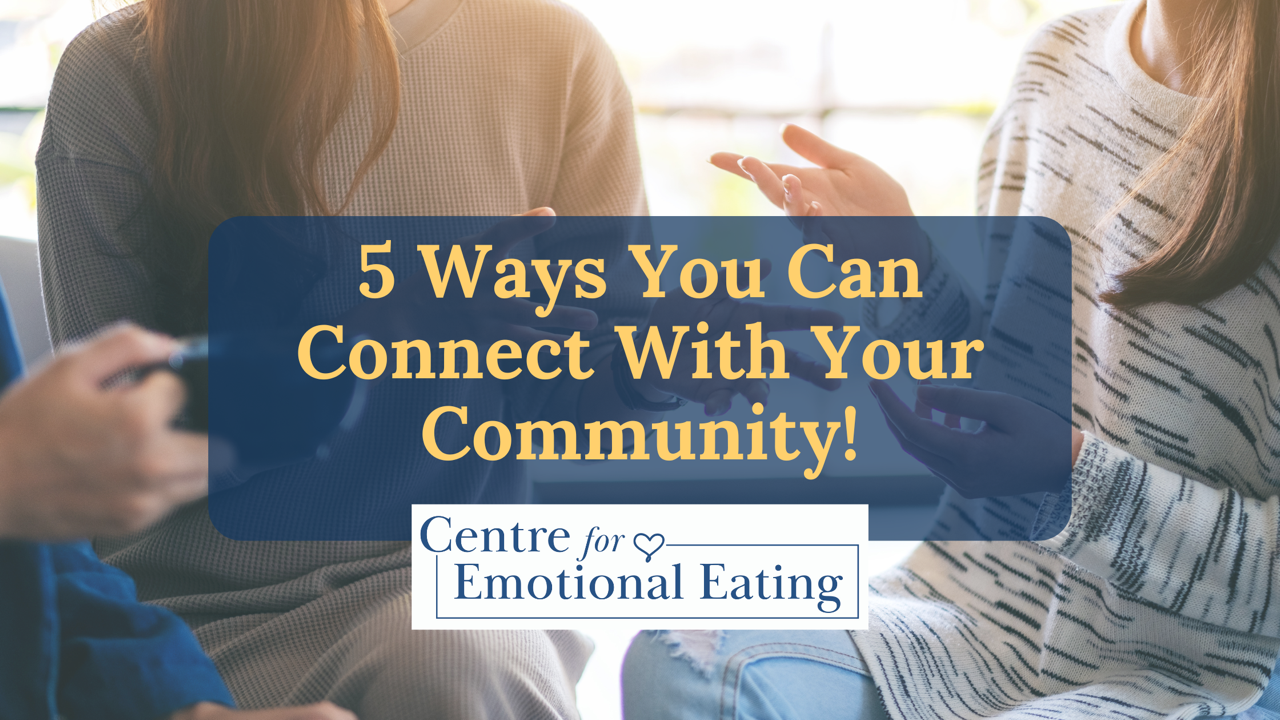BLOG
Find support not just for emotional eating, but all aspects of your well-being.
Eating for the Season

Winter can be a challenging time for many people. Less sunlight, colder temperatures, and unpredictable weather can make it difficult to keep your mood up. One of the ways you may be looking for comfort is through food, and that is normal! People often think that emotional eating is automatically bad or negative, but the truth is it is a coping mechanism just like scrolling on your phone or journaling. With awareness you can begin to understand why you reach for certain foods when you feel a certain way.
And it is usual for your cravings to change with the seasons! Cooler temperatures can have us reaching for mashed potatoes and creamy soups. The warmth, texture, and carbs feel like a hug when the Winter feels cold and isolating. Many would agree that a salad or smoothie that was so refreshing in July just isn’t as tempting in January.
Learning to go with the flow of your food preferences is a great way to also help manage your emotional eating. This process has you gently check in w...
3 Emotional Eating Tips to Survive the Holidays

The snow isn’t the only thing swirling as we face the holiday season: emotions can feel all over the place as we’re faced with more things on our to do list that usual. Plus, there are so many opportunities where we are faced with food: dinners, potlucks, parties! If you’re an emotional eater you might dread this time of year.
But you don’t have to feel helpless. Below are three key things you can implement right now to start feeling calmer around food.
This time of year might bring with it specific family recipes you look forward to or limited-time store-bought items you crave. But this mindset can have you believing that these foods are scarce and you have to eat them every chance you get to make sure you take advantage of them being available.
- Try this: Start by giving yourself permission to eat the things you really enjoy. Practicing this means you’ll be much more satisfied by what you put in your mouth. And an interesting mental shift can happen when you know you can eat what ...
There Are No Negative Emotions

As an emotional eater you might feel like you can identify emotions as either good or bad.
Hope, joy, satisfaction, those must be good because they make you feel positive and present.
Anxiety, sadness, anger, those must be bad because they feel uncomfortable and challenging.
This is called black-and-white thinking or sometimes referred to as all-or-nothing thinking. Chances are you learned this way of thinking from family and society. Were you ever told to hide what you were feeling to make others more comfortable? Or maybe you were told that emotions are weak or to “put your big girl pants on.” Just like labeling foods as either good or bad, approaching emotions the same way doesn’t allow for the truth: that there is a much more neutral, or grey, area.
Let’s reframe! What if instead of thinking of certain emotions as bad, you replace that thought with a neutral one like “there are no bad emotions.” This neutrality means we’re not pretending to be happy or applying a toxic positivi...
The Only Diet Rule You Need

Does this sound familiar: you’ve had a weekend of saying “screw it!” and have eaten every food you can think you want (even if it doesn’t taste amazing). It’s now Sunday and you feel overfull, your brain is foggy, and you’re beating yourself up for all the things you ate. You decide that tomorrow you’re getting “back on the wagon” and will “be good” by starting a new diet. Rules are back on Monday! No sugar, less carbs, all protein and vegetables and definitely an hour or more at the gym.
Stop. Re-read that paragraph. Notice how this example goes from what feels like a free-for-all/there are no rules to adding in ALL the rules? This is called the binge/restrict cycle and the whole system keeps you stuck because you get fed up with how you feel when you’re overeating (so you set rules) and then you feel deprived by such a rigid way of eating that it is only natural for you to want some freedom around food.
This is a really common situation, so if this seems familiar and maybe you’ve e...
Finding Some Comfort While Grieving

We’re told that grief has stages that we move through, that there is an end to the process. But the truth is much more complex than that. While its intensity can lessen over time, there are often triggers, sometimes unexpected ones, that bring up feelings in new and painful ways.
And while grief is a common experience, it is still a topic many feel uncomfortable talking about. For example, if you’ve lost someone you love, others in your community might not know how to talk to you about it even if you want to keep the conversation—and memory—of your person present. Others often worry they are making you feel worse you by asking how you’re coping.
If you are struggling with grief right now, we want you to know there is no right or wrong way to move through it. To start, reach out to someone you trust or get support from a therapist to help guide you. You might be surprised how freeing it feels to have a safe space to cry or rage. This can create a release of emotions that you don’t hav...
Journaling Prompts for Fall

There is something about the Fall season that seems to bring about feelings of routine and reflection. Maybe it’s the back-to-school feeling we never quite lose, the colder weather having us slow down, or being aware that the calendar year is coming to a close. No matter what it is for you, know that you are not alone and that this time of year can have an impact on your mood.
To support you through these feelings and the sense of transition, we’ve got some journal prompts to help you reflect on what you might be experiencing and support you through it. Feel free to answer one or all of these in the way you enjoy journaling. That could look like full paragraphs, a few bullets, or even key words on a page with your doodling. There is no wrong way!
- What are some of your memories around Fall? How do they make you feel?
- What have you done in the past—hay rides, reading a scary Halloween book, baking with apples—that you’d like to try and do again this Fall?
- What is something you’re l ...
How to Trust Feeling Good After Life Throws You a Curveball

Being on the other side of a challenging life changing event can feel destabilizing. After a period of new levels of anxiety or depression symptoms, you don’t trust feeling good. The truth is that you’re no longer used to feeling positive.
You might feel foolish for not immediately embracing the good, but this lack of trust is much more common than you think! Below we’ve outlined the three stages you can expect when you’ve done the work to move through big emotions and negative experiences.
Step One: You Can’t Believe It
At some point in your recovery, you will notice a subtle shift. It might be in a therapy session when you realize you’re talking about your experiences differently or it might be a moment during your day where you think or react differently than you would in the past. This might be accompanied by a rush of gratitude: you’ve made a change and are “on the other side.”
This will likely be immediately followed by mentally shutting down recognizing (or celebrating!) thi...
How Mindfulness Can Help with Emotional Eating

From easy-to-use apps to therapy practices, mindfulness seems to be an ever-present technique for managing our fast-paced world. But is it more than just a buzzword? Research shows that being more mindful can reduce stress and anxiety, alleviate depression, support your physical health, and more!
In today’s blog post, we’re breaking down just how you can implement this powerful tool into your life with just a few minutes at a time.
What is mindfulness?
Mindfulness is bringing awareness to the present moment. This looks like tapping into what your body is feeling, what thoughts or feelings are floating to the surface, and what you can see and feel (like the sunshine on your face). That might sound intimidating—especially if you’re someone who eats to avoid intense emotions—but acknowledging sensations, smells, and in the present moment means you can let go of anxiety of the future or grief over the past.
How can it help me with my emotional eating?
Emotional eaters often reach for ...
Changing Your Eating Patterns (Without it feeling like restriction)

Here at the Center for Emotional Eating we know that a restrictive diet is not a solution to anything: weight loss, peace of mind, fitting in. We’re not about restricting, but embracing (and eating!) the foods we like and make us feel our best.
So, what happens when there is a need to change your eating? Maybe you’ve developed a new food allergy or heartburn after eating certain foods. Maybe a bout of food poisoning or the flu means you just can’t face eating a specific item again. And did you know our taste buds change as we age? The meals and foods you’ve always relied on might not be as satisfying anymore. And satisfaction is key to avoiding binge eating!
Wanting to avoid these negative outcomes is perfectly human! But if you’ve been on the diet wagon a lot in your life, you might feel like removing specific foods feels a lot like new restrictive rules.
We’re here to help! Try these two steps to navigate your changing tastes without feeling like you’re slogging through new dietin...
Tapping into the Power of Community (For extroverts AND introverts!)

The restrictions from the pandemic has left many looking for a renewed sense of connection. Online get togethers got us through social distancing, but there seems to be a growing desire to meet up again in person.
You might be reading that and thinking “Not me! I thrived with more alone time”, and while that might be true (we all need opportunities to recharge) even introverts need a community they can tap into just as much as extroverts!
We’ve written before about how creating connection can help with feelings of loneliness (a major trigger for emotional eating), but getting a feeling of connection doesn’t have to mean a filled-to-the-brim calendar of social events. It is true that you can have a small circle of friends that you feel close to or be surrounded by many people and feel lonely. Connecting with others isn’t about the number of people you interact with or events you attend, it’s how it makes you feel! So, here are some ideas for you to try out in your own life to create c...


